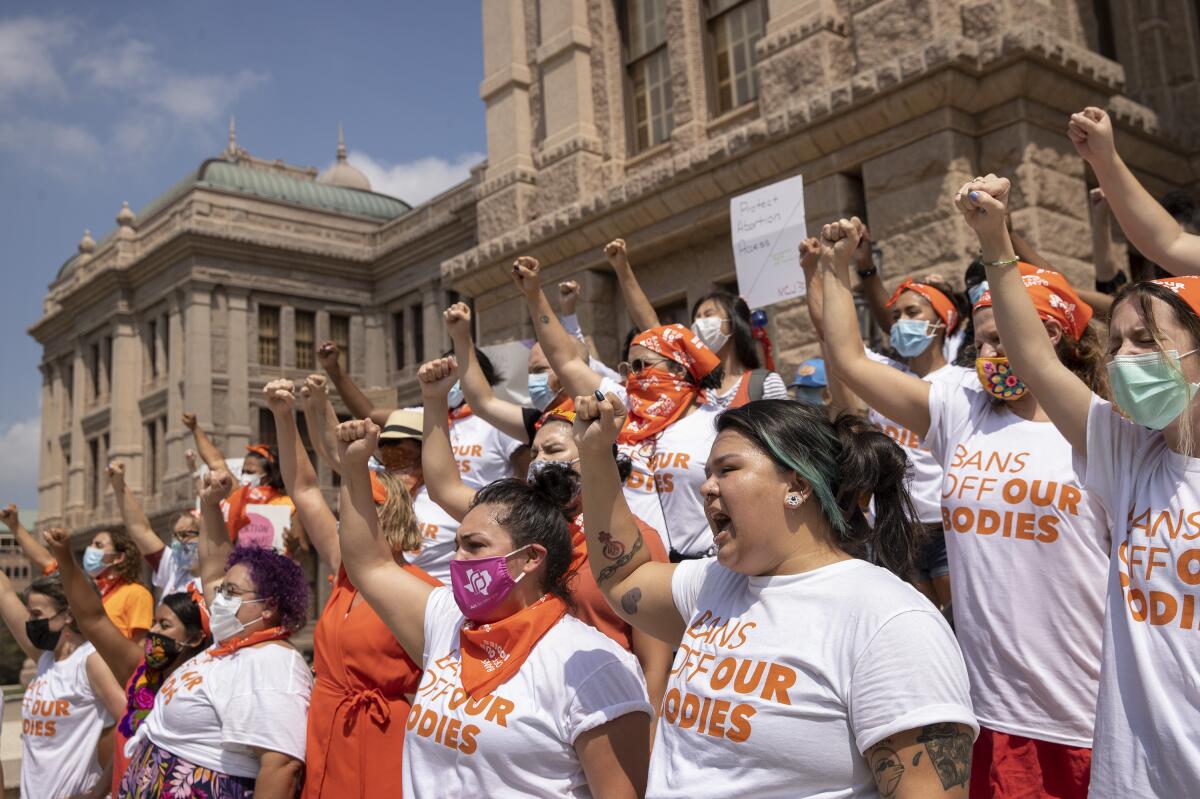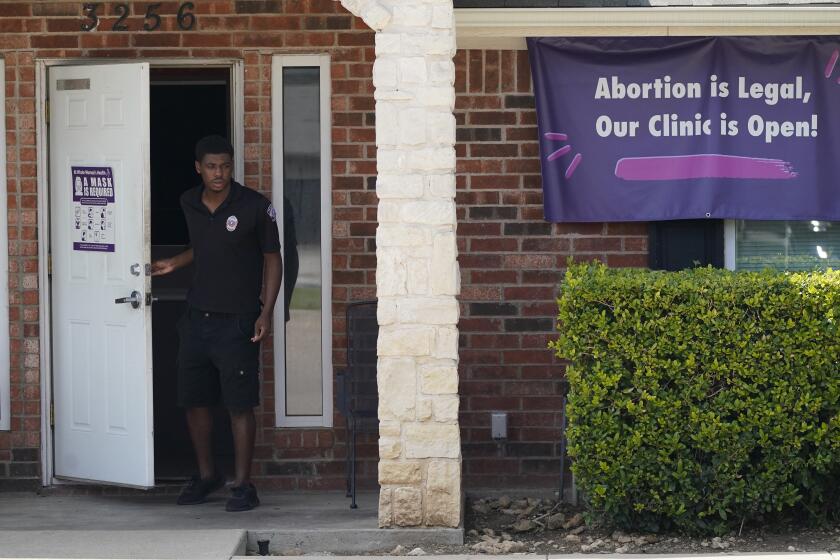Texas’ restrictive abortion law goes back before a judge

- Share via
AUSTIN, Texas — A federal judge Friday will consider whether Texas can leave in place the nation’s most restrictive abortion law, which since September has banned most abortions and sent women racing to get care beyond the borders of the second-largest state in the U.S.
A lawsuit filed by the Biden administration seeks to land the first legal blow against the Texas law known as Senate Bill 8, which thus far has withstood an early wave of challenges — including at the Supreme Court, which allowed it to remain in force.
“Abortion care has almost completely stopped in our state,” Dr. Ghazaleh Moayedi, a Texas abortion provider, told the U.S. House Oversight and Reform Committee during a hearing over abortion access Thursday.
The law, signed by Republican Gov. Greg Abbott in May, prohibits abortions in Texas once cardiac activity is detected, usually around six weeks, which is before some women know they are pregnant. In the short time since the law took effect Sept. 1, abortion providers say “exactly what we feared” has become reality, describing Texas clinics that are now in danger of closing while neighboring states struggle to keep up with a surge of patients who drive hundreds of miles from Texas. Other patients, they say, are being forced to carry pregnancies to term.
U.S. District Judge Robert Pitman of Austin will hear arguments Friday over whether to temporarily halt the Texas law, the biggest curb to the U.S. constitutional right to an abortion in a half-century.
The Justice Department has pushed for the court to act swiftly, but it is unclear how soon Pitman will decide.
Staff at Texas abortion clinics are surveilled constantly. People eager to sue us send fake patients into our clinics to see if we will break the law.
It is also unclear how quickly any of Texas’ nearly two dozen abortion clinics would move to resume normal operations if the law is set aside. Texas officials would likely seek a swift reversal from the 5th U.S. Circuit Court of Appeals, which previously allowed the restrictions to take effect.
The Texas law is just one among a number of statutes shaping up as the biggest test of abortion rights in the U.S. in decades. It’s part of a broader push by Republicans nationwide to impose new restrictions on abortion.
On Monday, the Supreme Court begins a new term, which in December will include arguments in Mississippi’s bid to have the landmark Roe vs. Wade decision guaranteeing a woman’s right to an abortion overturned.
Last month, the court did not rule on the constitutionality of Texas’ law in allowing it to remain in place. But abortion providers took that 5-4 vote as an ominous sign about where the court, its conservative majority fortified with three appointees of former President Trump, might be heading on abortion.
Corporate America has been almost silent on a Texas law that bans most abortions and promotes vigilantism. That’s no surprise when its own interests are at stake.
Other states, mostly in the South, have passed similar laws that ban abortion within the early weeks of pregnancy, all of which judges have blocked. But a wrinkle in Texas’ version has so far outmaneuvered courts: Enforcement is left to private citizens, not prosecutors.
Under the Texas law, anyone can file a lawsuit not only against abortion providers, but persons suspected of even helping a patient get an abortion after cardiac activity is detected. The person bringing the lawsuit is entitled to at least $10,000 in damages if they prevail, which critics say amounts to a bounty.
The Texas Attorney General’s Office argued in court filings this week that even if the law were put on hold temporarily, providers could still face the threat of litigation over violations that might occur in the time between a permanent ruling is issued.
“The federal government’s complaint is that the Heartbeat Act is difficult to effectively enjoin,” the state wrote in objection to the lawsuit by the Biden administration. “But there is no requirement that a state write its laws to make them easily enjoined.”
At least one Texas abortion provider has admitted to violating the law and been sued — but not by abortion opponents. Instead, former attorneys in Illinois and Arkansas say they sued a San Antonio doctor in hopes of getting a judge who would invalidate the law.
More to Read
Sign up for Essential California
The most important California stories and recommendations in your inbox every morning.
You may occasionally receive promotional content from the Los Angeles Times.















